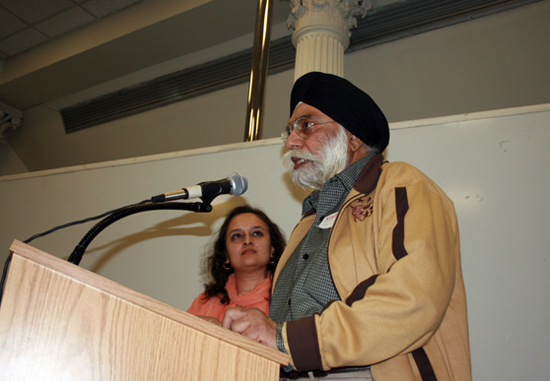
BY ALINE REYNOLDS | Financial District residents who live near the World Trade Center aren’t the only ones bemoaning the NYPD’s proposed security plan for the site.
Cab drivers who have seen the plan are vowing to stay out of Downtown altogether if the checkpoints and other security measures are implemented as planned. Some of the drivers attended a public hearing held last Wed., March 14 at the Department of City Planning to voice their concerns.
By 2019, when the W.T.C. site is expected to be fully built out, police will be screening all cars seeking to enter or pass through the site and will restrict vehicular access along Greenwich, Washington, Vesey, Fulton and Liberty Streets as well as West Broadway.
Though he makes most of his money Downtown, Beresford Simmons, who has driven a taxi for nearly 40 years, said the W.T.C. checkpoints would be a huge deterrent to picking up fares in Lower Manhattan.
“[With] the checkpoints, I guarantee you, a lot of us are going to avoid going Downtown,” said Simmons. “I would ask you gentleman who are in charge of this [security] program to consider the cab drivers. We are not terrorists, we are hardworking men and women in this city.”
Cab driver Javaid Tariq also said he’d hesitate driving around Lower Manhattan once the new security plan takes effect.
“We’re not against security measurements… but think about how this will affect cab drivers’ economic situation,” said Tariq. “If we’re headed to Brooklyn, we have to take Chambers Street to access the Brooklyn Bridge, and it’s going to be a traffic mess all the time. Time is money. How are we going to make our money?”
Tariq said he would also avoid Downtown out of fear of being singled out by police because he is Muslim.
“Where there are more cops, there are always unfair summonses,” said Tariq.
While fewer cabs will bother traveling to Downtown because of the heightened security, the plan would discourage local residents and workers from purchasing their own cars, according to Bhairavi Desai, executive director of the New York Taxi Workers Alliance. Desai said the proposed security plan would leave Downtown residents, visitors and workers with scant options for private transportation.
Currently, 94 percent of trips from Lower Manhattan to the tri-state airports are via yellow taxi, according to Desai, who added the plan would be financially “devastating” for the city’s taxi industry.
“[As it is, the drivers are] laboring 60-to-70 hours a week and their yearly earnings amount to less than minimum wage,” said Desai. “It will greatly impact our ability to earn that hard-earned living.”
Community Board 1 members and other local residents who also testified at the hearing asserted that the current plan would infringe on their daily lives.
C.B. 1 Chair Julie Menin said she witnessed first-hand the negative effects of security checkpoints, having previously run a business directly in front of the NY Stock Exchange.
“Many of the small businesses in the area closed within one year of the checkpoint opening,” said Menin.
Cars passing through the checkpoint were forced to wait 15-to-20 minutes during certain times of the day, Menin recalled.
“Obviously, we at C.B. 1 are not questioning the need for security,” said Menin. “We the people who live and work Downtown recognize we’re the number one terrorist target in the world. But what we are asking for is that the security measures be implemented in a way that recognizes the impacts to residents and to Downtown businesses.”
Kathleen Moore, a resident of 125 Cedar St., expressed concern over access to emergency services and requested that Cedar Street be made a westbound street again so that those who live on the block and are trying to get home by car can avoid having to go through two checkpoints on Greenwich Street. The vehicular direction of Cedar Street between Trinity Place and Greenwich Street was reversed last year to accommodate firetrucks’ leaving the Ladder 10 firehouse.
“I was there on 9/11, I was there in 1973 [when the W.T.C. first opened], I don’t intend to move, and I’d like to make sure that my neighborhood is accessible to me and that it is pleasant for everyone,” said Moore.
To help alleviate the hassle for local car owners, C.B. 1 Vice Chair Catherine McVay Hughes requested that neighborhood residents and businesses be incorporated into the security plan’s Trusted Access Program, which is supposed to expedite vehicular entry through the W.T.C. for office tenants, car services, delivery vans and even taxis.
“They’ve been part of the rebuilding process,” said Hughes of the locals.
The comment period will remain open through Monday, March 26. Comments can be sent to Lieutenant David Kelly at the New York Police Department, One Police Plaza, New York N.Y. 10038, or via e-mail to WTCEIS@nypd.org.































